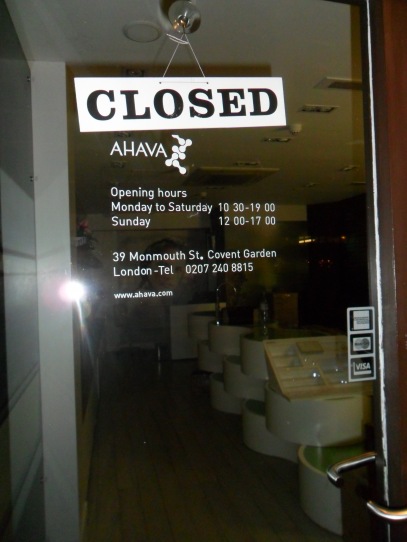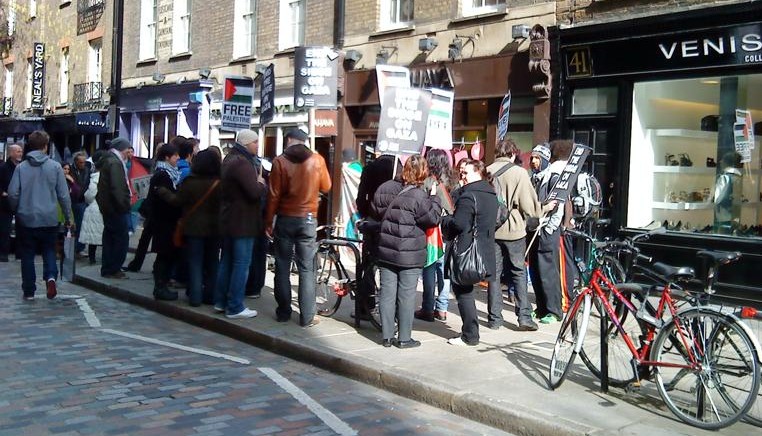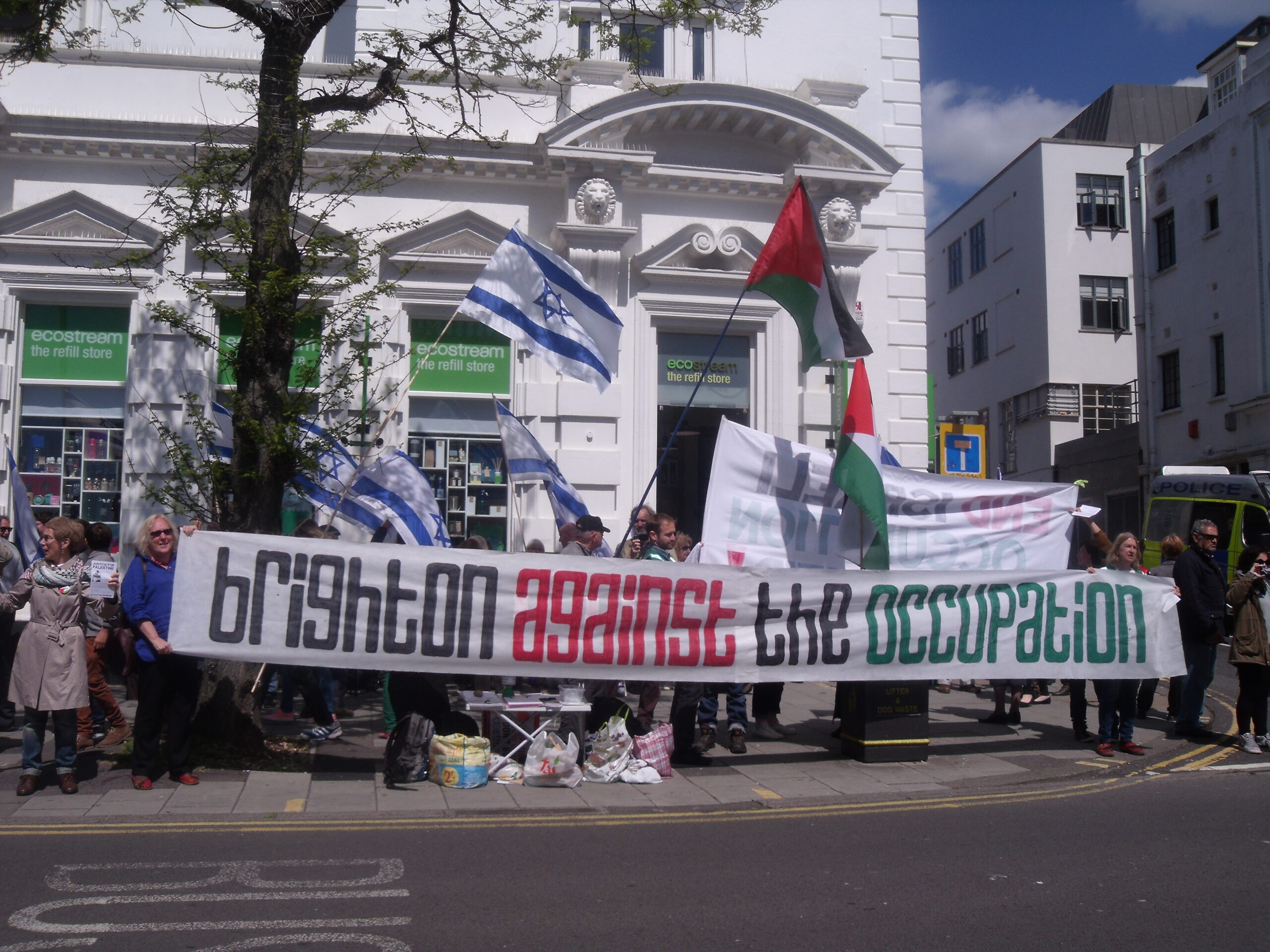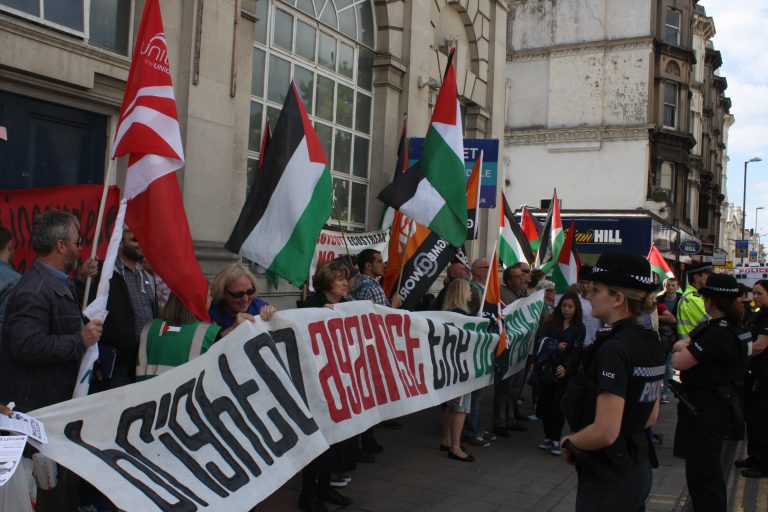By Tom Anderson & Therezia Cooper
An appeal to the Supreme Court by two campaigners against the Ahava store in London has been unsuccessful.
The campaign
Ahava manufactures its products at the Israeli settlement of Mitzpe Shalem in the occupied West Bank. The settlements of Mitzpe Shalem and Kibbutz Kalia are shareholders in the company (see here).
Ahava, a multinational Israeli Dead Sea products company, was forced to close its flagship store Monmouth Street, central London in 2011 after two years of concerted campaigning by grassroots groups.
The case

The sign on the door of Ahava’s flagship London store the day it closed due to a successful direct action campaign
The two campaigners, Matt Richardson and Gwen Wilkinson, had locked themselves to a concrete barrel inside the Ahava store on Monmouth street with the aim of stopping the shop from doing business. The store closed for the day. Police arrived and cut them free. They were arrested for aggravated trespass under Section 68 of the Criminal Justice and Public Order Act.
In their defence they argued that the store’s business was unlawful on the basis that the shop was:
-
-
aiding and abetting a war crime by aiding the transfer of Israeli civilians into the Occupied Palestinian Territories
-
The products in the shop were criminal property as they were the proceeds of a war crime
-
The products had fraudulently claimed the benefits of the Eu-Israel Association Agreement
-
The products had been labelled Israeli when they were in fact from a settlement
-
In the Magistrate’s Court the defendants were not successful. They were given a conditional discharge and a fine. In an appeal to the High Court the judge upheld their conviction.
The campaigners were appealing against their conviction to the Supreme Court and on the following point of law: “Should the words ‘lawful activity’ in section 68 Criminal Justice and Public Order Act 1994 be limited to acts or events that are ‘integral’ to the activities at the premises in question?”
The court ruled that the answer to that question is “yes” and that the convictions should be upheld. Importantly the judgement says that for activists to use the defence that businesses are unlawful in aggravated trespass cases then the unlawful business must be integral to the business obstructed. i.e it might follow that if activists lock themselves to the gate of a pharmaceutical company that is involved in illegal animal testing then it is only a defence in court to argue that the company’s business isn’t lawful if the business you disrupt is ‘integrally’ involved in the unlawful activity.
The judgement can be viewed here, and here
The option of appealing to the European Court is still open to the defendants.
Implications
The ruling is an example of the English court system attempting to close avenues for lawful resistance to corporate crime. In reality, corporations are multinational enterprises that commit crimes across continents. The defence that was the subject of the appeal has often been a chance for ordinary people to express their anger against these crimes.
Its important not to overestimate the importance of this ruling – it only actually adjudicated on the application of the defence in aggravated trespass case. It does not rule out the use of similar defences in criminal damage cases like those used by the Raytheon 9 and the EDO decommissioners, who were found not guilty after breaking into arms factories linked to the supply of arms to Israel and destroyed machinery and computers in order to stop war crimes.

One of the fortnightly demonstrations that were held against Ahava’s shop in Monmouth Street before it closed down
Direct Action
Its also important to remember that the Ahava campaigners were successful in their campaign. The store closed down, not as a result of a court victory but as a result of a concerted grassroots campaign.
The victory came after two years of regular demonstrations, blockades of the store, legal challenges as well as acts of direct action which included activists daubing slogans on the windows, super-gluing the locks during the night and throwing paint bombs at the shop front. This combination of public demonstrations, legal challenges and clandestine direct action proved a successful formula.



1 Comment
Elizabeth Morley · 8th February 2014 at 5:13 am
Thank you to the doughty activists!